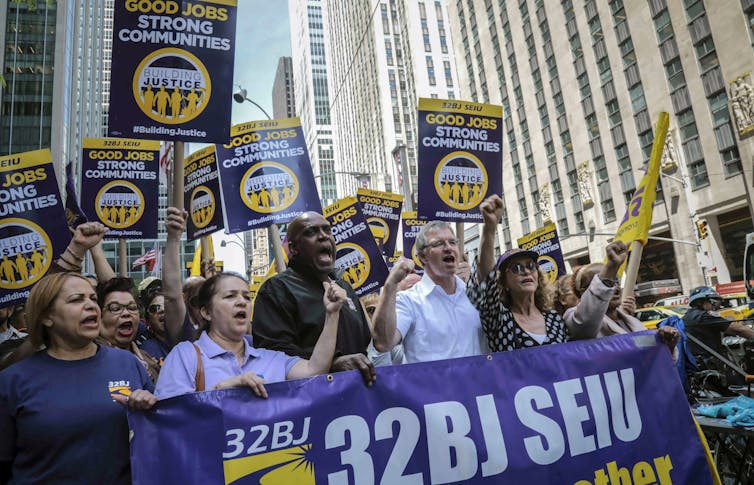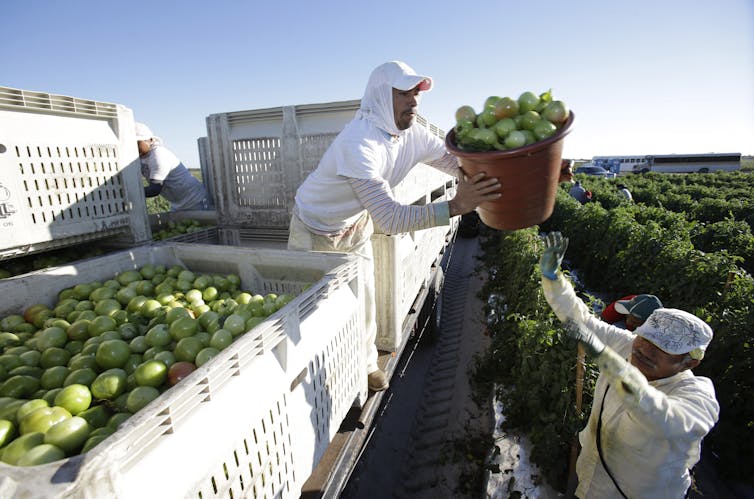Worker wins at Amazon and Starbucks recall a previous period of union success, writes Elizabeth Oglesby.

Members of a union representing workers who clean New York City offices march in 2019. (AP Photo/Bebeto Matthews)
By Elizabeth Oglesby
University of Arizona
 Tech workers, warehouse employees and baristas have notched many victories in recent months at major U.S. companies long deemed long shots for unions, including Apple, Amazon and Starbucks.
Tech workers, warehouse employees and baristas have notched many victories in recent months at major U.S. companies long deemed long shots for unions, including Apple, Amazon and Starbucks.
To me, these recent union wins recall another pivotal period in the U.S. labor movement several decades ago. But that one was led by migrants from Central America.
I’ve been researching human rights and immigration from Central America since the 1980s. In today’s polarized debates over immigration, the substantial contributions that Central American immigrants have made to U.S. society over the past 30 years rarely come up. One contribution in particular is how Guatemalan and Salvadoran immigrants helped expand the U.S. labor movement in the 1980s, organizing far-reaching workers’ rights campaigns in immigrant-dominated industries that mainstream unions had thought to be untouchable.
Migrants & Unions
More than 1 million Salvadorans and Guatemalans came to the United States from 1981 to 1990, fleeing army massacres, political persecution and civil war.
Since the 1980s, I have researched, taught and written about this wave of migrants. Back then, President Ronald Reagan warned apocryphally that Central America was a threat to the United States, telling Congress in 1983 that “El Salvador is nearer to Texas than Texas is to Massachusetts.”
Just 2 percent of Salvadorans and Guatemalans who applied received asylum in the 1980s – so few that a 1990 class-action lawsuit alleging discrimination compelled the U.S. government to reopen tens of thousands of cases. In recent years, about 10 percent to 25 percent of their asylum petitions were granted.
Then, as now, many undocumented immigrants in the U.S. worked in agriculture or service industries, often under exploitative conditions. Unionization barely touched these sectors in the 1980s.
More broadly, the bargaining power of labor unions was suffering under Reagan, whose presidency started with his firing of 11,0000 striking air traffic controllers. Downsizing and outsourcing at American companies in the 1980s also eroded union membership and pushed wages down.
Many Guatemalans and Salvadorans were veteran community organizers. They had faced down government terror to participate in unions, peasant leagues, Catholic social justice campaigns or Indigenous rights initiatives – all currents in 1980s revolutionary Central America.
Drawing on these experiences, many Central American immigrants began to organize in their U.S. workplaces, demanding higher wages and safer conditions.
Salvadorans Led Justice for Janitors to Victory
Salvadoran immigrants in California were pivotal in Justice for Janitors, a pioneering low-paid workers’ movement that inspired today’s US$15 minimum wage campaign.
Justice for Janitors began in Los Angeles in 1990. It aimed to reverse the wage drops that janitors suffered over the past decade.
Rather than do battle with the small subcontractors that hired cleaning crews for big office buildings, Justice for Janitors targeted the corporations that owned those buildings. Led by experienced Salvadoran unionists – some of whom had fled death squad violence back home – the movement used nonviolent civil disobedience and strikes to expose exploitative labor practices.
Speaking out could be dangerous. Police once clubbed participants at a peaceful march through Los Angeles’ Century City neighborhood on June 15, 1990. Undocumented workers feared deportation.
But it worked. Janitors in Los Angeles won a 22 percent raise after their 1990 citywide strike, showing mainstream labor unions that even the city’s most marginalized workers – undocumented Central Americans, many of them women – had real organizing power.
Over the next decade, some 100,000 janitors nationwide joined the campaign, under the banner of the Service Employees Industrial Union. The movement negotiated contracts that increased wages and health benefits for janitors across the U.S.
Guatemalans Defended Florida Farmworkers
Hundreds of thousands of people fled Guatemala during the early 1980s, escaping a genocidal army campaign against Indigenous communities that left entire regions of its highlands charred and empty.
Roughly 20,000 of these Guatemalan refugees, many of whom spoke Mayan languages, landed in Florida in 1982, finding work in sweltering tomato farms and citrus groves.
Up to 90 percent of the fresh tomatoes in U.S. supermarkets come from Florida.
Working conditions in the state’s tomato fields were dismal in the 1980s. Migrants earned just 40 cents per 32-pound bucket of tomatoes picked. Some were forced by armed guards to work against their will, as a 1997 court case about the use of slave labor in Florida’s tomato fields exposed.
In 1993, Guatemalan immigrants joined with Florida’s Haitian and Mexican farmworkers to form the Coalition of Immokalee Workers, a community worker alliance that began in the basement of a local church in Immokalee, Florida. It used strategies common to Latin American protest movements, including street theater and socially conscious radio broadcasts, to unite Florida’s agricultural workers.
After five years of work stoppages, hunger strikes and marches, Florida’s tomato pickers won wage increases of up to 25 percent. A multiyear nationwide boycott of Taco Bell convinced the fast-food chain in 2005 to increase the earnings of the farmworkers who supply its ingredients. Other fast-food giants followed suit.
In 2015, the Immokalee coalition launched the Fair Food Program, an industrywide agreement with Florida tomato growers to promote strict health and safety standards and allow outside monitors to oversee working conditions. That same year, President Barack Obama gave the Coalition of Immokalee Workers the Presidential Award for Extraordinary Efforts in Combating Modern Day Slavery.

Farmworkers with the Coalition of Immokalee Workers, one of the United States’ most successful agricultural labor unions, collect tomatoes in Naples, Florida. (AP Photo/Wilfredo Leef)
Guatemalans Organized North Carolina Poultry Plants
As Guatemalan migrants spread across the South during the late 1980s, recruited by labor contractors in other states, they soon became a powerful organizing force in North Carolina, too.
Case Farms, a poultry company that supplies KFC, Taco Bell, Boar’s Head and the federal school lunch program, was a notoriously dangerous place to work. Safety regulations were routinely ignored to increase output, and workers suffered serious injuries – including losing limbs to cutting machines.
In 1990, the Guatemalan immigrants at Case Farms’ plant in Morganton, North Carolina, organized a union drive.
As labor historian Leon Fink describes in his book The Maya of Morganton: Work and Community in the Nuevo New South, Guatemalan poultry workers drew on prior organizing experiences back home – including coffee plantation strikes and Mayan pride movements – to organize workers.
After five years of walkouts, marches and hunger strikes, the Case Farm workers voted in 1995 to join the Laborers’ International Union of North America. The company refused to negotiate, however, and the union pulled out of contract talks after six years.
In 2017, Sen. Sherrod Brown of Ohio challenged Case Farms to explain its alleged violations of U.S. law, after a New York Times and ProPublica investigation exposed ongoing abusive labor practices there.
Central American migrants have helped make the U.S. a safer place for workers.
This is an updated version of an article originally published on Jan. 18, 2019.![]()
Elizabeth Oglesby is associate professor of Latin American studies and geography, University of Arizona.
This article is republished from The Conversation under a Creative Commons license. Read the original article.
The views expressed are solely those of the author and may or may not reflect those of Consortium News.

It is quite true that our south and central American brothers arrive here with a better understanding of class struggle than their homegrown peers in the US. What they have accomplished against the machine that brings them here is pathetic.
The author mentions a divisive debate over immigration: no such debate exists. “Both” make-believe “sides” in the immigration debate desire and continually support the creation and maintenance of a perennial underclass willing to work for pennies of the dollar their time and efforts are worth.
The criminal farm cartels which began importing undocumented workers to break the farmworker unions back in the late forties and early fifties in California never, in their wettest dreams, imagined the ploy would exceed their venal hopes so wildly. If the Depression taught those dumb Okies one thing, it was to stick together, and farmworker unions were gaining strength, insisting on human dignity, and the worth of human effort… until the illegal importation of serf labor from the south began.
My south and central American neighbors are the best neighbors in my county. They understand community’s value to each individual, they take pride in working hard and making good homes for their families. They also work at scab wages in unspeakable conditions. This is possible for them because they know how to share, how to cooperate with each other, how to bow the back and trudge on no matter how deeply the lash cuts. They learned it well from their Euro-mix masters back home, who keep their working populations’ faces pressed to the dirt through naked coercive violence. Their steel commitment to each other and to family makes it possible for them to live better here than back home, at wages that make it impossible for the homegrown laboring class to find work they can afford to take.
The individuals with whom I’ve spoken about it feel sympathy for the American workers they have displaced, but think our people are too soft and ignorant to accurately assess the risk of having their noses bloodied by the cops and strikebreakers. They are correct. The formerly skilled and semi-skilled American laborer dies a little every shift, selling Chinese socks to the neighbor who sells her Chinese shoes, and knows that something’s wrong, that one day the pretend economy is going to finally break for good and all. Grandma may have spent her working life bent over a sewing machine in a textile factory, but she owned a real house with a yard and a garden, ate real food, took paid vacations, visited her doctor without fear of the bill, and put the smartest of her children through college. Never more.
There may come a day when Americans of every class that earns its living reach out to each other and to our undocumented underclass in solidarity. Billions are being spent to prevent this possibility, or even the possibility of thinking, much less teaching it. Meanwhile what passes for discussion of labor issues lauds workers insisting that Amazon let them eat two crumbs of each dozen loaves they bake, and praises our latin neighbors for insisting Tyson and Case actually pay them the one-third of a living wage they are content to take.
There is a great deal more to be said. When will the first brave voices ring with truth in anger for the betrayal and the rape of their class?